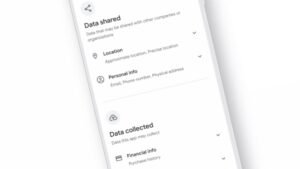Google follows Apple and requires app developers to report their data collection policies in an easy-to-read format for users.
On Tuesday, the company announced a new “Data Security section” for app listings in the Google Play Store. This means you no longer have to go in search of an app’s privacy policy page, many of which can be long and full of legal jargon.
Instead, the Data Security section is designed to answer how an app collects and shares user data in a single language. “Users will start seeing the Data Security section of Google Play today, and developers are required to complete this section for their apps by July 20,” the company said.

Google created the new data security section with reference to consumer demand. Currently, when you install an app, Android OS will detail which data permissions the software needs to work. However, Google found that both users and app developers would like to see more context around data usage.
“Users want to know for what purpose their data is being collected and whether the developer shares user data with third parties,” the company wrote. “Additionally, users want to understand how app developers secure user data after an app is downloaded.”

The resulting Data Security section is similar to Apple’s “Privacy Nutrition Labels”, which the company introduced in 2020. In Google’s case, the Data Security section will offer an overview of the app’s data policies, including whether any of the data collection is mandatory or optional.
Developers will also need to disclose the app’s security practices, such as whether data is encrypted during transit and whose users can request to have data deleted. “As app developers update their functionality or change their data management practices, they will showcase the latest in the app’s data security section,” the company added.
Recommended by our editors
The new system can also help improve security in the Google Play Store, as it will give consumers an easy overview of each app’s data collection approach. Presumably, shady apps that do not comply will also be removed from the app store.
However, the new section on data security does not necessarily cover all the ways in which data can be shared or collected via an app. “In some cases, developers do not have to disclose data as ‘shared’, even if it is technically transferred to another party (for example, when you give your consent to transfer the data after the app has explained how it will use the data, or when the data is shared with a developer’s service provider), “Google’s Support Page for Comments on the Data Security section.
Google also does not take into account data collected if it was done through end-to-end encryption or if the app only pulled the data on your phone but never sent it to a server. “For example, if a weather app sends your location from your device to get the current weather at your location, but the app only uses your location data in memory and does not store the data for longer than necessary to provide the weather,” the company said .
Get our best stories!
sign up What’s new now to have our top stories delivered to your inbox every morning.
This newsletter may contain ads, offers or affiliate links. Subscribing to a newsletter indicates your consent to our terms of use and privacy policy. You can unsubscribe from the newsletters at any time.
